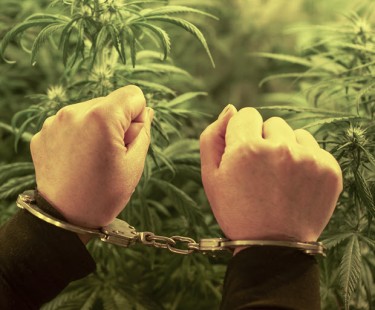Cannabis News
Why is the DEA, an Enforcement Agency, Making the Decision on Whether Marijuana is Legal or Not?
Published
7 months agoon
By
admin

The DEA shouldn’t be in charge of scheduling Marijuana says Jesse Ventura
And he’s not alone!
In a recent development that has caught the attention of cannabis advocates and lawmakers alike, the Drug Enforcement Administration (DEA) has indicated that it is following the necessary procedures in its marijuana rescheduling review.
This revelation came in response to a letter sent by a group of 21 lawmakers from both the House and Senate, urging the agency to promptly deschedule marijuana. The DEA’s Acting Chief of Congressional Affairs, Michael Miller, stated in a letter to Senator Elizabeth Warren and others that the agency will “follow the procedures that Congress set forth in the Controlled Substances Act, including an opportunity for a public comment period and a hearing.”
While these comments may seem routine, they provide valuable insight into the DEA’s potential plans for the coming weeks and months. The mention of a public comment period and hearing is particularly significant, as these steps would only be necessary if the DEA decides to reschedule marijuana from its current Schedule I status. This could mean that the agency is considering either rescheduling marijuana to Schedule III, as recommended by the Department of Health and Human Services, or descheduling it entirely.
If the DEA does choose to reschedule or deschedule marijuana, the public will have a 30-day window to provide comments on the recommendation before it can officially take effect. This opportunity for public input is crucial, as it allows stakeholders, experts, and concerned citizens to voice their opinions and contribute to the decision-making process.
The DEA’s acknowledgment that it is carefully following the procedures outlined in the Controlled Substances Act while conducting its administrative review of marijuana’s schedule is a positive sign for those who have long advocated for a change in the drug’s legal status.
However, the agency’s motives and the eventual outcome of this review remain uncertain.
But should the DEA even have the authority to schedule cannabis? This question lies at the heart of the ongoing debate surrounding marijuana policy in the United States. In this article, we’re going to explore this idea in detail, examining the arguments for and against the DEA’s role in determining the legal status of cannabis.
Since the beginning of the Biden Administration’s efforts to reschedule marijuana, there have been doubts about the endgame. When they revealed their push for Schedule III, it became apparent that this was a move to grant the pharmaceutical industry control over the cannabis market.
Here’s a timeline of the events that have unfolded:
-
Late 2022: President Biden issues an executive order directing HHS to review marijuana’s status as a Schedule I drug and provide a recommendation on rescheduling.
-
August 2023: After a year-long review, HHS sends a letter to the DEA requesting that marijuana be moved to Schedule III.
-
September 2023: An anonymous Biden Administration official expresses belief that marijuana will be moved to Schedule III before the 2024 election.
-
October 2023: A bipartisan group of 31 congressmembers sends a letter to the DEA, urging them to consider fully descheduling marijuana.
-
December 2023: HHS releases a 250-page document explaining their rationale for wanting the DEA to reschedule marijuana to Schedule III.
-
January 2024: Colorado Attorney General Phil Weiser leads a group of 12 state attorneys general in sending a letter to the DEA, advocating for rescheduling.
-
February 2024: Speculation about an impending announcement from the DEA begins to circulate.
-
March 2024: President Biden becomes the first president to promote marijuana law reform during a State of the Union address.
-
April 2024: The DEA indicates they are in the process of writing a recommendation, with Administrator Anne Milgram set to make a decision on marijuana’s scheduling status.
The most recent development, with the DEA actively working on a recommendation, is significant because it suggests that the agency is closer than ever to potentially rescheduling marijuana.
Historically, the DEA has not been this close to making such a monumental change in cannabis policy.
It’s worth noting that the popularity of cannabis legalization has reached an all-time high, and with the November elections looming, Democrats may be doubling down on cannabis reform to secure the significant “cannabis vote” that could sway the outcome of the elections.
However, if cannabis isn’t rescheduled or legalized prior to November, there is no guarantee that the Biden Administration won’t backpedal or pull a “bait and switch” tactic. The cannabis community must remain vigilant and continue to push for meaningful reform, regardless of the political landscape.
Former Minnesota Governor Jesse Ventura has been a long-time advocate for cannabis legalization, and his recent interview with Marijuana Moment highlights his unwavering commitment to the cause.
Ventura’s personal experience with the benefits of medical marijuana has fueled his passion for reform, as he credits cannabis with saving his wife’s life when she developed late-in-life epileptic seizures.
Ventura’s support for cannabis legalization dates back to his gubernatorial campaign, when he openly embraced the issue despite warnings from his party that it could cost him the election. “It didn’t hurt me a bit,” Ventura said.
“It actually, I think in the end, strengthened me because it showed the public I have balls enough to bring up topics that were real in life and not be the typical politician and sweep them under the rug and run from them.”
His success in the election serves as a testament to the fact that people are willing to elect officials who are open about their cannabis use and support for reform. Ventura believes that if he were running for office today, he would make cannabis legalization a top campaign issue to align with the “loyal” base of consumers eager for change.
One of the key points Ventura raised in the interview was his criticism of the Drug Enforcement Administration’s (DEA) role in the cannabis rescheduling process. He questioned why the DEA, an enforcement agency, is allowed to make decisions on the legal status of marijuana, stating, “I guess the first thing that I did was I had to scratch my head and go, ‘Why is the DEA, the enforcement people, allowed to make the decisions on whether it should be legal or not?'”
Ventura pointed out the inherent conflict of interest in the DEA’s involvement, saying, “Excuse me, they have the biggest conflict of interest of anybody on the planet, right? Because if they keep it illegal, that means they stay in business and they get way more money allocated to them by the federal government to continue to go out and bust people for cannabis. How come they’re the deciding agency?”
He further emphasized his point by drawing a comparison to law enforcement, stating, “Excuse my French, but that’s bullshit. You know, that’s like putting the police in charge of lawmaking. You elect people to make laws. The police merely enforce the law. Why are you allowing the enforcer of the law to make the law?”
Ventura’s critique of the DEA’s role in the rescheduling process highlights the need for a more impartial and evidence-based approach to cannabis policy reform. As support for legalization continues to grow, with a recent poll showing that one in five American adults are regular marijuana consumers, it is crucial that the decision-making process is guided by science and public opinion rather than the interests of enforcement agencies.
As the 2024 presidential election approaches, Ventura believes that embracing cannabis reform could be a winning strategy for candidates looking to secure the significant “cannabis vote.” While he acknowledged that President Donald Trump might face pushback from his evangelical base if he were to support legalization, Ventura maintains that the time is right for bold action on cannabis policy.
With his newly launched cannabis brand, Jesse Ventura Farms, the former governor is committed to making a positive impact on the industry and the lives of those who can benefit from medical marijuana. As he continues to champion reform, Ventura’s message is clear: it’s time for the federal government to catch up with public opinion and end the prohibition of cannabis once and for all.
Jesse Ventura’s critique of the Drug Enforcement Administration’s (DEA) role in the cannabis rescheduling process is spot on. The fact that the very agency responsible for enforcing drug laws is also tasked with determining the legal status of substances like marijuana is an inherent conflict of interest. As Ventura aptly put it, this arrangement is akin to allowing the police to make the laws they enforce. It’s an insane setup that undermines the principles of fairness and impartiality in our legal system, and it’s something that America needs to address urgently.
While the potential rescheduling of cannabis to Schedule III might seem like progress, it’s crucial to recognize that this move could be primarily a power grab by the pharmaceutical industry. If marijuana remains on the controlled substance act in any capacity, it is still, in essence, illegal. To put this into perspective, we can equate the situation to slavery: descheduling would be akin to liberty, while Schedule III is like having permission to go to town unattended while still being considered someone’s property. True progress will only be achieved when cannabis is completely removed from the controlled substance act.
As the 2024 elections approach, it’s important for voters to be aware of the games politicians play when it comes to hot-button issues like cannabis legalization. While Democrats may tout their support for reform as a core part of their campaign strategy, it’s worth noting that they failed to legalize marijuana despite having majority control over the past four years. This inconsistency should give pause to anyone who believes that campaign promises will inevitably lead to meaningful change.
At the end of the day, the path to genuine cannabis reform is fraught with obstacles, including entrenched interests, political maneuvering, and a lack of political will. As citizens, it is our responsibility to hold our elected officials accountable and demand that they take action to end the failed war on drugs and the unjust prohibition of marijuana.
Only by remaining vigilant, informed, and engaged can we hope to achieve the kind of lasting change that will benefit individuals, communities, and our nation as a whole.
THE DEA STRUGGLES ON CANNABIS, READ ON…
WHY IS THE DEA ARRESTING MORE PEOPLE FOR WEED AFTER LEGALIZATION?
You may like
-


4 Ways Marijuana Can Help You Have A Better Thanksgiving
-


Can Big Alcohol Help The Cannabis Industry
-


California Appeals Court Rejects Marijuana Grow Permit, Citing Federal Illegality
-


Expert Lighting Tips For Successful Indoor Growing Weed
-


Acne And CBD: Exploring Alternative Dermatological Solutions
-


Can I Gift Marijuana This Holiday Season?
Cannabis News
California Appeals Court Rejects Marijuana Grow Permit, Citing Federal Illegality
Published
12 hours agoon
November 22, 2024By
admin
In a landmark decision that highlights the tension between state and federal cannabis laws, a California appellate court ruled on October 29th that property owners can refuse to allow the transportation of cannabis across their land via easements, even when the cannabis operation is approved by local authorities.
The Second District Court of Appeal’s unanimous decision draws attention to private property rights in a context where cannabis remains federally illegal, but state law allows licensed cultivation, distribution and sale. Presiding Justice Albert Gilbert stated, “No matter how much California voters and the Legislature might try, cannabis cultivation and transportation are illegal in California as long as it remains illegal under federal law.” JCCrandall LLC v. County of Santa Barbara, Case No. B333201, 2024 WL 4599304, Oct. 29, 2024.
Unless the California Supreme Court grants review – which I would not rule out – the decision empowers private property owners to refuse to contract with cannabis businesses, and restricts local government from approving cannabis operations that implicate the property rights of neighbors who object.
The case at hand
The dispute centered around a cannabis cultivation operation in Santa Barbara County, where JCCrandall LLC challenged a conditional use permit granted by the County to its neighbor, Santa Rita Holdings Inc. The critical issue was that Santa Rita Holdings could only access its 2.5-acre cannabis farm via an unpaved road crossing JCCrandall’s property through a pre-existing easement. JCCrandall grows oats and barley.
JCCrandall’s primary concern? It raised a number of complaints with the Santa Barbara County Supervisors about truck traffic and night operations, which did not gain traction, but in the Court of Appeal JCCrandall focused on what it claimed was potential liability associated with having federally illegal substances transported across its property, even though County regulators found that the Santa Rita operation was fully compliant with state and local laws.
Key legal findings
The appellate court’s decision hinged on several crucial points:
- Property Rights: The court emphasized that “the right to exclude others is the essence of the right of property ownership” and classified it as a fundamental vested right.
- Federal Supremacy: The panel determined that allowing cannabis transportation across private property “defies the Supremacy Clause” of the U.S. Constitution.
- State vs. Federal Law: While cannabis might be legal under California law, the court ruled that federal law’s prohibition takes precedence in this context.
California cannabis industry implications
Legal experts suggest this ruling could have far-reaching consequences for California’s cannabis industry. Section 1550.5(b) of the California Civil Code makes contracts within California involving cannabis lawful and enforceable, and Santa Rita Holdings bet the ranch on that argument. But the Court of Appeal held that the statute could not compel a landowner to allow cannabis to travel across its property on a pre-existing easement. Licensed operators may find it harder to do business because neighbors who have property rights affected by a cannabis business can object, and, under the JCCrandall ruling, local government must yield to those objections.
An example might be a cannabis dispensary that depends on access to its parking lot via an easement or is located in a shopping center where other lessees have rights to object to tenants notwithstanding the approval of the landlord. In cultivation, many cannabis farms depend on vehicular access through easements because they are remote and do not always have direct access to public thoroughfares, or they depend on water sourced from other properties pursuant to agreements made by prior owners who grew traditional crops. These neighbors might not need to show any negative impact on their property, but can argue that they could be found complicit in federally illegal activities.
I think the most problematic language in the JCCrandall ruling is the following, which might draw the attention of the California Supreme Court and cause it to grant review: “For as long as an easement is enjoyed, its mode and manner of use shall remain substantially the same as it was at the time the easement was created. The County argues the easement was used for agricultural purposes. But there is a vast difference between legal and illegal agricultural purposes.” (Emphasis added.) If California has determined that cannabis cultivation is legal – as it has – and state courts routinely enforce contracts involving cannabis, it is a pretty bold step to declare the use of a lawful pre-existing easement illegal simply because the agricultural crop is cannabis and take away easement access from Santa Rita.
Looking ahead
This decision creates new challenges for cannabis businesses in California, and will result in more disputes among neighbors. While the Biden administration has shown signs of easing federal marijuana restrictions, this ruling demonstrates that the federal-state law conflict continues to create significant legal hurdles for the cannabis industry.
California court decisions also can be persuasive authority in other states, so we might see similar litigation (and decisions) elsewhere in the country where cannabis has been legalized.
The case serves as a reminder that despite California’s progressive stance on cannabis, federal prohibition continues to cast a long shadow over the industry’s operations and development. As the cannabis landscape continues to evolve, this ruling may prompt businesses to reassess their property arrangements and local governments will certainly have to reconsider their permitting processes to give more careful consideration to objections by neighbors who claim that their property rights are implicated by cannabis operations.
Note: This post was first published earlier this month on the Alger ADR Blog.
Cannabis News
Autoimmune Conditions Are Rising Fast in American Medicine, Can Cannabis Help?
Published
2 days agoon
November 21, 2024By
admin

Why Are Autoimmune Conditions On The Rise? And How Cannabis Can Help
Autoimmune diseases refer to a group of medical conditions that occur as a result of the immune system attacking your own tissues.
In a normal human body, the immune system is responsible for protecting the body by producing antibodies that prevent toxins, cancer cells, and viruses from harming the body. However, when one is struck by an autoimmune disorder, the immune system is no longer able to distinguish the difference between dangerous cells and healthy cells. As a result, the healthy cells are attacked, too.
Today, we know of around 100 different kinds of autoimmune conditions. Some of the most common examples of autoimmune conditions include rheumatoid arthritis (RA), lupus, inflammatory bowel disease, celiac disease, Type 1 diabetes, multiple sclerosis (MS), and the Guillain-Barre syndrome (GBS) to name a few. Others include Graves’ disease, Hashimoto’s thyroiditis, psoriasis, and vasculitis.
According to the National Health Council, around 50 million Americans are affected by autoimmune diseases today. This is a conservative estimate, considering that several autoimmune conditions are tricky to treat and so many people go undiagnosed for long periods of time. It’s worrisome to note that there are more people developing autoimmune diseases these days, many of which have reached levels comparable to epidemics.
But cannabis can help!
How Cannabis Can Help Curb And Manage Autoimmune Diseases
Not one single cause is responsible for the alarming growth of autoimmune diseases, though there are several factors at play. While there isn’t just one cause we can point at, it’s certain the reasons lie in our environment. After all, human genetics haven’t changed significantly yet the chemicals, toxins, and pollutants in our food and everyday items have risen dramatically.
In addition, people are getting less sleep than ever; stress rates are through the roof, and people are constantly worried. There is a clear link between psychological stress and physical health as well as immunity, which is why it isn’t unusual – it’s even common – to see many autoimmune disease cases flare up after people experience severe stress caused by grief, an accident, job loss, or the death of a loved one. These highly stressful and traumatic conditions wreak havoc on the body’s immune response, causing inflammation all over the body.
Conventional treatments prescribed to treat autoimmune conditions are focused on taming inflammation; these usually include steroids but also some non-steroidal drugs. These drugs often come with unwanted side effects, but research has shown that cannabis can work with the endocannabinoid system through THC and CBD, as well as other cannabinoids, to simulate similar results. In one study for example, we can see the clear association of the endocannabinoid system for neurodegenerative and inflammatory processes seen in Multiple Sclerosis and Amyotrophic Lateral Sclerosis.
There has also been an increasing number of studies proving the efficacy of cannabis for treating several autoimmune conditions.
Cannabis For Multiple Sclerosis
Multiple sclerosis is one of the autoimmune conditions where a growing number of studies have come out supporting the therapeutic benefits of cannabis for. In a 2024 study, patients with multiple sclerosis reported several improvements in quality of life after using cannabis-based medical products (CBMPs). For the study, British investigators analyzed the impact of cannabis based medicinal products made from either oil or extracts in 141 patients who were enrolled in the UK Medical Cannabis Registry.
The researchers then analyzed the changes in patient outcomes after a month, then three and 6 months after. According to the patients themselves, they were able to sustain improvements in their mental and physical health after marijuana therapy.
“This case series demonstrates a potential association between the initiation of CBMPs and improved patient reported outcomes in sleep, anxiety, and general HRQoL [health-related quality of life] measures, over six months,” said the study authors. “Additional measures for HRQoL, including various physical and mental health subdomains, also exhibit improvements up to six months when compared to baseline,” the authors concluded.
In another study from 2023, patients with multiple sclerosis reported significant improvements in symptoms after cannabis use. For the study, researchers from the Dent Neurologic Institute in Buffalo, New York, analyzed the medical records of 141 patients with multiple sclerosis, who were also legally authorized to consume medical marijuana products. They then analyzed data from the patients after one up to 4 follow-up sessions after the initial session of cannabis therapy. Sixty-five percent of patients consumed 1:1 THC:CBD tinctures.
According to the authors: “The results of this study indicate that use of MC [medical cannabis] to alleviate symptoms of MS is largely efficacious, with improvement in pain (72 percent of patients), muscle spasticity (48 percent of patients), and sleep disturbance (40 percent of patients) frequently reported.”
“More than half of opioid users at baseline were able to either discontinue or decrease their opioid use after starting MC. The mean daily MME [morphine milligram equivalents] was significantly reduced from the initial visit (51 mg) to the last follow-up visit (40 mg). This is consistent with previous literature showing that MC legalization is associated with decreased opioid use and that MC use is associated with decreased opioid use in patients with chronic pain. These findings indicate that MC may represent an alternative analgesic to opioids for some patients,” they wrote.
Anecdotal Evidence
While more studies are needed to determine cannabis’ effect on other autoimmune conditions such as rheumatoid arthritis, we can rely on anecdotal evidence. In 2020, data from the medical journal, Rheumatology, revealed that patients who have this condition, along with those who have lupus and fibromyalgia, consume cannabis.
In fact, it was reported that marijuana was extremely common especially for patients with fibromyalgia. “In this meta-analysis, we found that one in six patients suffering from rheumatologic disease actively consumes cannabis, reducing pain reduction… A favorable effect of cannabis on pain in our meta-analysis reinforces the idea that cannabis could be used for analgesic purposes,” the authors concluded.
Conclusion
Cannabis is a safe and natural way to help prevent and treat the symptoms of autoimmune disease. It targets inflammation at its root, and is a proven natural way to help cope with stress, pain, insomnia, and inflammation all while protecting the brain. However, it’s important to ensure you medicate with clean, organic sources of marijuana.
AUTOIMMUNE AND CANNABIS, READ ON…

The U.S. Senate’s version of the Farm Bill finally landed this week. They’re calling it the Rural Prosperity and Food Security Act of 2024 (the “Senate bill”). The Senate bill follows on the House’s proposal, called the Farm, Food and National Security Act of 2024 (the “House bill”), offered in May. Neither the Senate bill nor the House bill would preempt state or Indian law regarding hemp or the regulation of hemp products. This means states and tribes will retain a lot of latitude in regulating hemp and hemp-derived products– which gets people fired up.
Aside from giving states some runway, the Senate bill and the House bill differ in key respects regarding hemp. Therefore, these august bodies must confer and reconcile their sundry proposals. That could happen in 2024, but seems more likely in 2025 when the new Congress convenes. As of this week, though, we finally have a framework.
The Senate Bill re-defines “hemp” and defines “industrial hemp”
Section 10016 of the Senate bill (“Hemp Production”) amends the definition of “hemp.” Hemp was defined in the 2018 Farm Bill and removed from the federal Controlled Substances Act (CSA), taking us on a truly wild ride. See: What Happened to Hemp? (“What Happened”). The Senate bill also gives us a definition for “industrial hemp.” Here are those definitions, with points of emphasis in bold:
(1) Hemp. The term “hemp” means (A) the plant Cannabis sativa L. and any part of that plant, including the seeds thereof and all derivatives, extracts, cannabinoids, isomers, acids, salts, and salts of isomers, whether growing or not, with a delta-9 total tetrahydrocannabinol concentration (including tetrahydrocannabinolic acid) of not more than 0.3 percent on a dry weight basis; and (B) industrial hemp.
(3) Industrial Hemp. The term “industrial hemp” means the plant Cannabis sativa L. if the harvested material (A) is only (i) the stalks of that plant, fiber produced from those stalks, or any other manufactured product, derivative, mixture, or preparation of those stalks (except cannabinoid resin extracted from those stalks); (ii) whole grain, oil, cake, nut, hull, or any other compound, manufactured product, derivative, mixture, or preparation of the seeds of that plant (except cannabinoid resin extracted from the seeds of that plant); or (iii) viable seeds of that plant produced solely for production or manufacture of any material described in clause (i) or (ii); and (B) will not be used in the manufacturing or synthesis of natural or synthetic cannabinoid products.
The new regime
Again, the definitional stuff in bold is what I want to emphasize.
First, the Senate bill keeps the THC threshold at 0.3 percent, which is an arbitrary number we’ve been advocating against for years. The Senate bill mirrors the House bill in this respect, though, so we are stuck with this, unless Ron Paul gets his way.
Second, the Senate bill keeps the 2018 Farm Bill’s total THC standard, including THCA. The House bill does this too. This was fairly predictable: in What Happened, I wrote that we could “expect the total THC standard to remain, which means that actual Delta-9 THC won’t be the only metric for calculating THC content.”
We’ve also explained on this blog that the 2018 Farm Bill and USDA rules mandate total THC testing on pre-harvest hemp batches, but do not mandate such testing on post-harvest hemp or hemp products. The Senate bill doesn’t change this paradigm, which means the “loophole” for gas station weed remains open. This proposal is a big win for opponents of the House bill’s “Miller Amendment,” which would narrow the definition of “hemp” to exclude intoxicating hemp-derived substances.
Third, the Senate bill introduces a new definition and framework for industrial hemp. The House bill does this too, albeit slightly differently. The idea here is to invite farmers to grow hemp for fiber and grain purposes, while freeing them from regulatory burdens with the Department of Agriculture and criminal exposure with the Department of Justice. More specifically, for “industrial hemp” growers, the Senate bill:
- removes background check requirements;
- instates “relaxed regulatory requirements” for sampling and inspection methodologies (which will need to be adopted by rule); and
- develops a certified seed program.
The Senate bill also makes any hemp producer ineligible to grow hemp for five years if that producer, “with a culpable mental state greater than negligence, produces a crop of hemp that is inconsistent with that license.”(Hint: use the seed program.) The proof standard here seems like it could be an issue, and even if anyone has been adjudicated as growing marijuana under the guise of hemp, Farm Bill ineligibility seems like a far-off concern.
Bottom line
The big takeaway for me is that the Senate bill leaves the door open for intoxicating hemp products, whereas the Miller Amendment to the House bill does not. Something’s gotta give. And it needs to happen soon, because we’re already long overdue. As I explained in a webinar last week, the Farm Bill deals with the nation’s entire food supply, not just hemp. Therefore, this is not like with the SAFE Banking Act, where we have a proposed law specific to cannabis that may or may not ever pass. The Farm Bill must pass, and soon.
Stay tuned and we’ll keep you updated on any major happenings. For more on this topic, check out our massive hemp and CBD archive, or these specific, recent posts:

4 Ways Marijuana Can Help You Have A Better Thanksgiving

Can Big Alcohol Help The Cannabis Industry

California Appeals Court Rejects Marijuana Grow Permit, Citing Federal Illegality

Expert Lighting Tips For Successful Indoor Growing Weed

Acne And CBD: Exploring Alternative Dermatological Solutions

Can I Gift Marijuana This Holiday Season?

The Best Cocktails For An Easy Festive Thanksgiving

420 Vacations: Planning the Perfect Weed Vacation

Can Microdosing Help Manage Holiday Family Anxiety

11 Weed Shows and Movies on Netflix Worth Watching

Distressed Cannabis Business Takeaways – Canna Law Blog™

United States: Alex Malyshev And Melinda Fellner Discuss The Intersection Of Tax And Cannabis In New Video Series – Part VI: Licensing (Video)

What you Need to Know

Drug Testing for Marijuana – The Joint Blog

NCIA Write About Their Equity Scholarship Program

It has been a wild news week – here’s how CBD and weed can help you relax

Cannabis, alcohol firm SNDL loses CA$372.4 million in 2022

A new April 20 cannabis contest includes a $40,000 purse

Your Go-To Source for Cannabis Logos and Designs

UArizona launches online cannabis compliance online course
Trending
-

 Cannabis News2 years ago
Cannabis News2 years agoDistressed Cannabis Business Takeaways – Canna Law Blog™
-

 One-Hit Wonders2 years ago
One-Hit Wonders2 years agoUnited States: Alex Malyshev And Melinda Fellner Discuss The Intersection Of Tax And Cannabis In New Video Series – Part VI: Licensing (Video)
-

 Cannabis 1012 years ago
Cannabis 1012 years agoWhat you Need to Know
-

 drug testing11 months ago
drug testing11 months agoDrug Testing for Marijuana – The Joint Blog
-

 Education2 years ago
Education2 years agoNCIA Write About Their Equity Scholarship Program
-

 Cannabis2 years ago
Cannabis2 years agoIt has been a wild news week – here’s how CBD and weed can help you relax
-

 Marijuana Business Daily2 years ago
Marijuana Business Daily2 years agoCannabis, alcohol firm SNDL loses CA$372.4 million in 2022
-

 California2 years ago
California2 years agoA new April 20 cannabis contest includes a $40,000 purse





